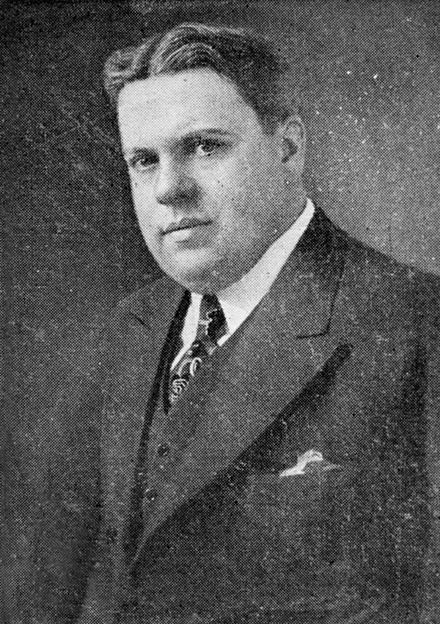
The 1918 influenza pandemic was an unusually deadly influenza pandemic, the first of the two pandemics involving H1N1 influenza virus. It infected 500 million people around the world, including people on remote Pacific islands and in the Arctic, and resulted in the deaths of 50 to 100 million, making it one of the deadliest natural disasters in human history.

Jean Schwartz was a Hungarian-born American songwriter.
Fred Fisher was a German-born American songwriter and Tin Pan Alley music publisher.

Lew Brown was a lyricist for popular songs in the United States. During World War I and the Roaring Twenties, he wrote lyrics for several of the top Tin Pan Alley composers, especially Albert Von Tilzer. Brown was one third of a successful songwriting and music publishing team with Buddy DeSylva and Ray Henderson from 1925 until 1931. Brown also wrote or co-wrote many Broadway shows and Hollywood films. Among his most-popular songs are "Button Up Your Overcoat", "Don't Sit Under the Apple Tree", "Life Is Just a Bowl of Cherries", "That Old Feeling", and "The Birth of the Blues".

Gustav Gerson Kahn was an American lyricist.
Eighteen or 18 may refer to:

Armentières is a commune in the Nord department in the Hauts-de-France region in northern France. It is part of the Urban Community of Lille Métropole.

The 1918 World Series featured the Boston Red Sox, who defeated the Chicago Cubs four games to two. The Series victory for the Red Sox was their fifth in five tries, going back to 1903. The Red Sox scored only nine runs in the entire Series, the fewest runs by the winning team in World Series history. Along with the 1906 and 1907 World Series, the 1918 World Series is one of only three Fall Classics where neither team hit a home run.

"The Victors" is the fight song of the University of Michigan (UM) written and composed by UM student Louis Elbel in 1898. The song was first played publicly by John Philip Sousa and his band.

"Tiger Rag" is a jazz standard that was recorded and copyrighted by the Original Dixieland Jass Band in 1917. It is one of the most recorded jazz compositions. In 2003, the 1918 recording of "Tiger Rag" was entered into the U.S. Library of Congress National Recording Registry.

Sam M. Lewis was an American singer and lyricist.

Henry King was an American film director. Seven of his films were nominated for the Academy Award for Best Picture.

"Rock-a-Bye Your Baby with a Dixie Melody" is a popular song written by Jean Schwartz, with lyrics by Sam M. Lewis and Joe Young. The song was introduced by Al Jolson in the Broadway musical Sinbad and published in 1918.
"The Real American Folk Song " is a 1918 song composed by George Gershwin, with lyrics by Ira Gershwin.

"After You've Gone" is a 1918 popular song composed by Turner Layton with lyrics by Henry Creamer. It was recorded by Marion Harris on July 22, 1918, and released by Victor Records. The chorus adheres to a standard ABAC pattern but is only 20 measures long. There are four 4-bar phrases, followed by a 4 measure tag. The song is harmonically active, with chord changes almost every measure. The opening four notes are identical to the opening notes of Peg o' My Heart (1912)—at the time songwriters often borrowed the first few notes of a hit melody.

The Ukrainian War of Independence, a period of sustained warlike conflict, lasted from 1917 to 1921 and resulted in the establishment and development of a Ukrainian republic – later a part of the Soviet Union as the Ukrainian Soviet Socialist Republic of 1922–1991. The war consisted of a series of military conflicts between different governmental, political and military forces. Belligerents included Ukrainian nationalists, anarchists, Bolsheviks, the forces of Germany and Austria-Hungary, the White Russian Volunteer Army, and Second Polish Republic forces. They struggled for control of Ukraine after the February Revolution in the Russian Empire. The Allied forces of Romania and France also became involved. The struggle lasted from February 1917 to November 1921 and resulted in the division of Ukraine between the Bolshevik Ukrainian SSR, Poland, Romania, and Czechoslovakia. The conflict is frequently viewed within the framework of the Russian Civil War of 1917–1922, as well as the closing stage of the Eastern Front of the First World War of 1914–1918.

"Oh! How I Hate to Get Up in the Morning" is a song written by Irving Berlin in 1918 that gives a comic perspective on military life. Berlin composed the song as an expression of protest against the indignities of Army routine shortly after being drafted into the United States Army in 1918. The song soon made the rounds of camp and became popular with other soldiers, partly because hatred of reveille was universal.
Miss 1917 is a musical revue with a book by Guy Bolton and P. G. Wodehouse, music by Victor Herbert, Jerome Kern and others, and lyrics by Harry B. Smith, Otto Harbach, Henry Blossom and others. Made up of a string of vignettes, the show features songs from such musicals as The Wizard of Oz, Three Twins, Babes in Toyland, Ziegfeld Follies and The Belle of New York.

The Hackney Scout Song Book contains a collection of songs which were popular in the early days of the Scout Movement in the United Kingdom. Although originally intended for the use of Scouts in the Hackney district of East London, it quickly became the standard work of its type in the UK and around the world. First printed in December 1921, the last edition was published in 1972.
"Ajax-mars" is the official club song of Dutch association football club AFC Ajax since 1918.


















